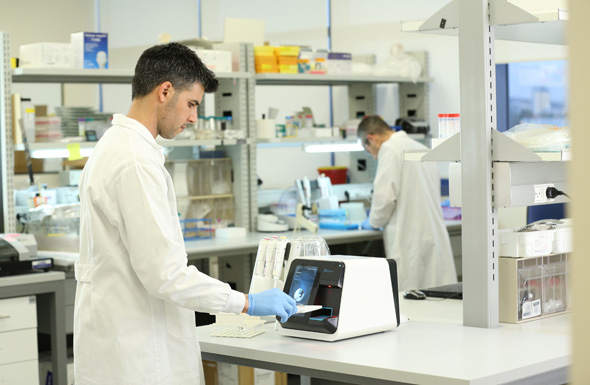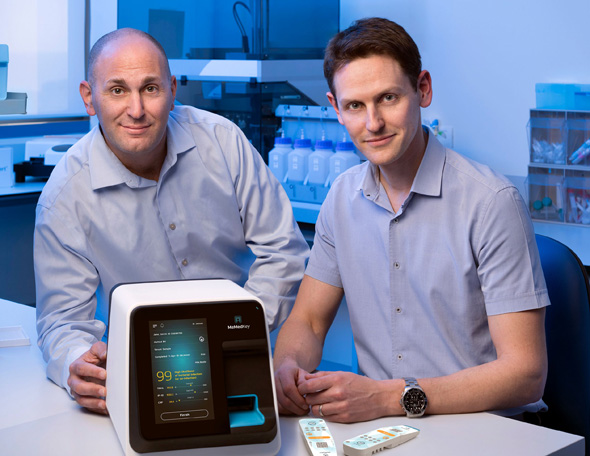Interview
MeMed analyzes complex immune responses to answer simple health questions
Growing biotechnology company MeMed Diagnostics Ltd. is transforming the way doctors have traditionally treated infections by looking to the body’s immune system for answers
MeMed Diagnostics Ltd., an Israeli company based in the northern city of Haifa has been working on new ways to fight diseases by relying on immunological research. The company developed MeMed BV and MeMed Key, which are multi analytes and machine learning based algorithms that work together to analyze immune responses to infections, providing researchers and healthcare providers with crucial answers. The technology measures three host-immune proteins and enables doctors to understand whether a patient’s infection is viral or bacterial, determine whether or not to administer antibiotics and make quick life-saving decisions.
 MeMed CEO Eran Eden. Photo: MeMed
MeMed CEO Eran Eden. Photo: MeMed
The product has been tested by over 15,000 patients during clinical studies, receiving full clearance in Israel, Switzerland, and elsewhere in Europe, and is working toward being approved in the U.S. Company co-founder and CEO Eran Eden spoke to Calcalist about the product and how it will revolutionize the way healthcare providers treat patients.
He explained its solution using the all-too-familiar scenario—the common cold. “Imagine a child goes to the doctor with a runny nose. Where did the child pick this up from? Parents? Siblings? Friends at school? We should be asking whether this is a bacterial or viral infection? Are antibiotics required or not? Does the patient need to be hospitalized?”
“We’re really good at listening to when your body responds to something, and have developed advanced technologies that allow us to translate these responses into signals that can ultimately improve peoples’ lives. These are some of the holy grail questions that we’ve been trying to tackle,” he explained.
While MeMed’s first-generation product was done manually, the company's second-generation version is done by machine-learning alone. Researchers are hoping to examine in the future an infection's severity, and how soon a patient’s condition could deteriorate.
 MeMed's lab in action. Photo: MeMed
MeMed's lab in action. Photo: MeMed
“When you bring a child to the doctor, the decision on whether or not to treat him or her with antibiotics seems simple, but it isn't. Our product provides insights to some of the biggest challenges of our time, namely the overuse of antibiotics, which are ineffective at treating viral infections, and the growing prevalence of antibiotic-resistant bacteria.” According to experts, the latter could exact a toll of ten million deaths and a loss of $100 trillion in GDP by 2050, Eden added.
Eden noted that the team screened patients’ immune systems for immune responses, while the patients were fighting bacterial or viral infections, and identified several proteins. “Some of these proteins increase in your bloodstream, when you have an infection, no matter your age. Some are present whether you have the flu or Covid-19, whether you’re sick for a week or for a month,” he added.
The company’s MeMed Key platform can measure these proteins accurately and provide answers in real-time, something that is drastically needed in regards to any disease, but especially during a global pandemic.
“We use a complementary paradigm,” he explained, “rather than going after the pathogen, we use your immune response to tell us what’s going in your body. We are listening to how your system responds to the pathogen.”
“We’re turning traditional approaches to treating diseases upside down,” he explained. In traditional diagnostic testing, a result is either positive or negative, but doesn’t answer whether the person needs antibiotics or not, or whether the disease is developing into a serious case or is a milder version, or whether it is progressing quickly or not.
 MeMed Cofounders Eran Eden and Kfir Oved. Photo: MeMed
MeMed Cofounders Eran Eden and Kfir Oved. Photo: MeMed
“With our technology, we can answer these questions and this isn’t an easy task,” he added.
The company identified three biomarker proteins, one of which is key to identifying immune responses, the tumor necrosis factor-related apoptosis-inducing ligand, also known by its acronym TRAIL. Two others are used as well, interferon gamma induced protein-10 (IP-10), and C-reactive protein (CRP) that assist in providing details about a patient’s infection.
“We’ve found that the TRAIL protein shoots up in the bloodstream when someone is sick with a viral infection. However, TRAIL decreases in bacterial infections. In addition, TRAIL is undetectable when something bad is about to happen, in both viral and bacterial infections, and that gives us quick answers whether someone’s condition is going to deteriorate rapidly,” he explained.
- Italian biotech company DiaSorin to offer MeMed’s blood tests in Europe and USA
- MeMed Receives Regulatory Green Light for Test that can Greatly Reduce Antibiotics Prescriptions
- Remote healthcare ready to seize tectonic Covid-19 moment
The MeMed Key is a miniaturized immunoassay platform that takes a blood sample and measures the presence of certain proteins. “This technology is incredibly complex,” Eden added, “imagine you’re looking at a soccer field covered with M&M’s and then you place a few random Skittles there too. Now, imagine that you need to count all of the Skittles in 15 minutes over the entire soccer field, that’s difficult, but that’s what this technology can do,” he said.
“We were able to take the ingenuity of a huge, expensive, sophisticated machine in a lab, and miniaturize it,” he said. “It looks a bit like an apple device,” he quipped.
Furthermore, it can be used to measure a variety of infections and is multi-purpose.
In regards to the coronavirus, MeMed is studying how its technology can provide details on an infection’s severity and a patient’s response to treatment. Eden’s team, along with leading doctors, such as Dr. Shaul Lev and Dr. Boaz Tadmor at the Rabin Medical Center in Petah Tikva have been testing their findings.
So far, researchers have learned that the TRAIL protein becomes drastically low in severe Covid-19 patients, while in patients with milder versions of the disease, it increases dramatically. In that sense, it can foretell whether a body is reaching a hyperinflammatory state, where the immune system goes into hyperdrive, which could be deadly.
Eden believes that this technology will revolutionize the healthcare system. “We now have a window into seeing how our immune system responds to infections. Just by reducing antibiotic overuse, we are contributing immensely to limiting antibiotic-resistant bacteria. We’ll also better utilize resources. People can use our technology to build their own applications too, the sky's the limit.”
MeMed was founded by Eden during his PhD studies, together with his partner Dr. Kfir Oved who was in medical school at the time. The two began to test how the immune system responds to certain infections and located biomarkers. MeMed has several investors, among them, Solina Chau, from Horizons Ventures, who is also the largest stakeholder in Zoom Video Communications Inc.
“We care about solving big ugly problems that don’t have a solution in the 21st century,” Eden said. “While our technology is complex, our outlook is simple.”



